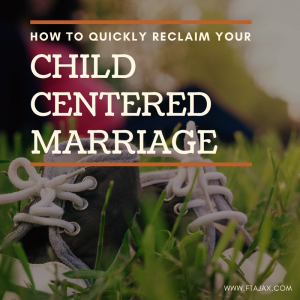 Child-centered marriages have been a common theme lately. I hear from couples in my office that this is one of the main reasons their relationships are suffering. Clients often share that the emotional connection within the relationship fades after becoming parents. It is not unusual to hear a married couple describe their relationship as that of roommates. They find the sense of loving support and deep connection has been replaced with feelings of dissatisfaction and even loneliness. They long for a more fulfilling relationship that more closely resembles the one they had before children entered the picture.
Child-centered marriages have been a common theme lately. I hear from couples in my office that this is one of the main reasons their relationships are suffering. Clients often share that the emotional connection within the relationship fades after becoming parents. It is not unusual to hear a married couple describe their relationship as that of roommates. They find the sense of loving support and deep connection has been replaced with feelings of dissatisfaction and even loneliness. They long for a more fulfilling relationship that more closely resembles the one they had before children entered the picture.
How did this Happen?
The transition to parenthood brings a lot of demands and expectations. Children require an enormous amount of our time and energy. Much of this is an unavoidable reality. Children are entirely dependent on us to care for them, keep them safe, teach them, and help them develop into fully-functioning, responsible adults. It’s a big job!
Our culture hasn’t helped the situation either! Within the past couple of decades, we seem to be overcompensating for previous generations that weren’t child-centered enough. When a child enters the picture, we suddenly feel enormous pressure to meet society’s definition of a “good parent.” We are expected to devote an immense amount of time and energy to carefully constructing the “perfect” childhood for our children. This includes providing a variety of enriching activities to “ensure” they develop into well-rounded individuals (check out our article, How to Stop Being a Helicopter Parent). There is an expectation for parents to shuffle kids to sports practices, science camps, social events with friends, and church activities. We may even be active participants in those activities ourselves. In addition, I’ve noticed that as a result of the demands on the child, many parents tend to feel guilty for their children being over-scheduled. In turn, they try to compensate by reducing household responsibilities…the very thing found to promote professional success!
Is there hope?
Also of interest, Dr. John Gottman, a prominent marriage researcher states, “the sad irony is that in trying to create the perfect life for their children…parents fail to provide what kids need most – a happy home.” Above all else, children need to feel secure. Children feel secure when they know their parents’ relationship with each other is strong. One of the best gifts we can give our children is a strong, healthy marriage relationship with our spouse. In doing so, we model for them what a mature relationship and a secure romantic bond look like.
There’s another benefit to this as well! When we intentionally create a healthy relationship, we are happier and less stressed as individuals, which makes for a happier, less-tense home environment. It also helps to remember that our children will not live with us for the rest of our lives…our spouses most likely will. You must remind yourself of this. Think ahead to what you want your marriage to be like once your children leave home.
I know you’re probably thinking, “that all sounds great, but easier said than done.” And you’re right! It is one thing to say it but another thing to do it! However, that doesn’t mean that the tough choices won’t be worth it. Below are some tangible steps you can take to help you reclaim your marriage.
How to Quickly Reclaim Your Child-Centered Marriage
Set boundaries
Set boundaries around how many extracurricular activities your child can participate in at a time. This will probably be difficult – you may feel guilty. You may fear being judged as a “bad” parent by your peers. You may fear you’re setting your child up for long-term failure. Don’t worry – they’ll still get into college! The idea that a child’s future is doomed if they haven’t participated in a multitude of extracurricular activities is false.
Stop Doing Their Chores & Homework
Say no to doing your child’s chores and homework for them. Notice that I didn’t say to never help them with homework – there’s a big difference between doing and helping. Have them help around the house. Sure, when they’re young, it can be frustrating that they can’t do as good of a job as you can. But this is how they learn. As they practice the skill, they develop a sense of competency which helps them feel prepared to take responsibility for their property as adults. So with this one, you’re accomplishing two things: saving yourself time, energy and stress, while also empowering your children and teaching them to be responsible.
Avoid Making Every Moment Revolve Around the Kids
Say no to making every free moment revolve around the kids…also hard. You may feel guilty that you don’t get enough quality time with them during the week, so you want to ensure your weekends are jam-packed with a kid and family-focused activities. Though these are important too, they can’t be the only relationships that get attention. Saying no to watching the kid-friendly movie together in favor of you and your spouse spending time together doing something more “adult” needs to happen regularly.
Get Creative about Childcare
When it comes to planning dates, whether that’s getting grandparents, or aunts and uncles on board, working out a child-swap date night plan with another couple in the neighborhood, or sacrificing daily Starbucks trips to set aside funds to pay for a babysitter, there are ways to work around the “who’s going to watch the kids?” question. Where there’s a will, there’s a way. When something’s important to us, it’s amazing the things we will do to find a way to make it work.
Show Affection to Your Spouse
Be affectionate with each other in front of your children. They may complain about how “gross” you’re being. That’s okay because inside, it makes them feel good to know that their parents are in love with each other.
Get Help
It’s ok to admit that you can’t do it on your own. These issues are often very complex and difficult to navigate. Have you been stuck in a pattern of child-centered living for so long that you feel hopelessly disconnected from your spouse? We are here to help you get back on track. Schedule couples therapy with us – it could be one of the best investments you ever make in yourself, your marriage, and your children.
For more information, see our other article, Why Putting Kids First Can Kill Your Marriage.

